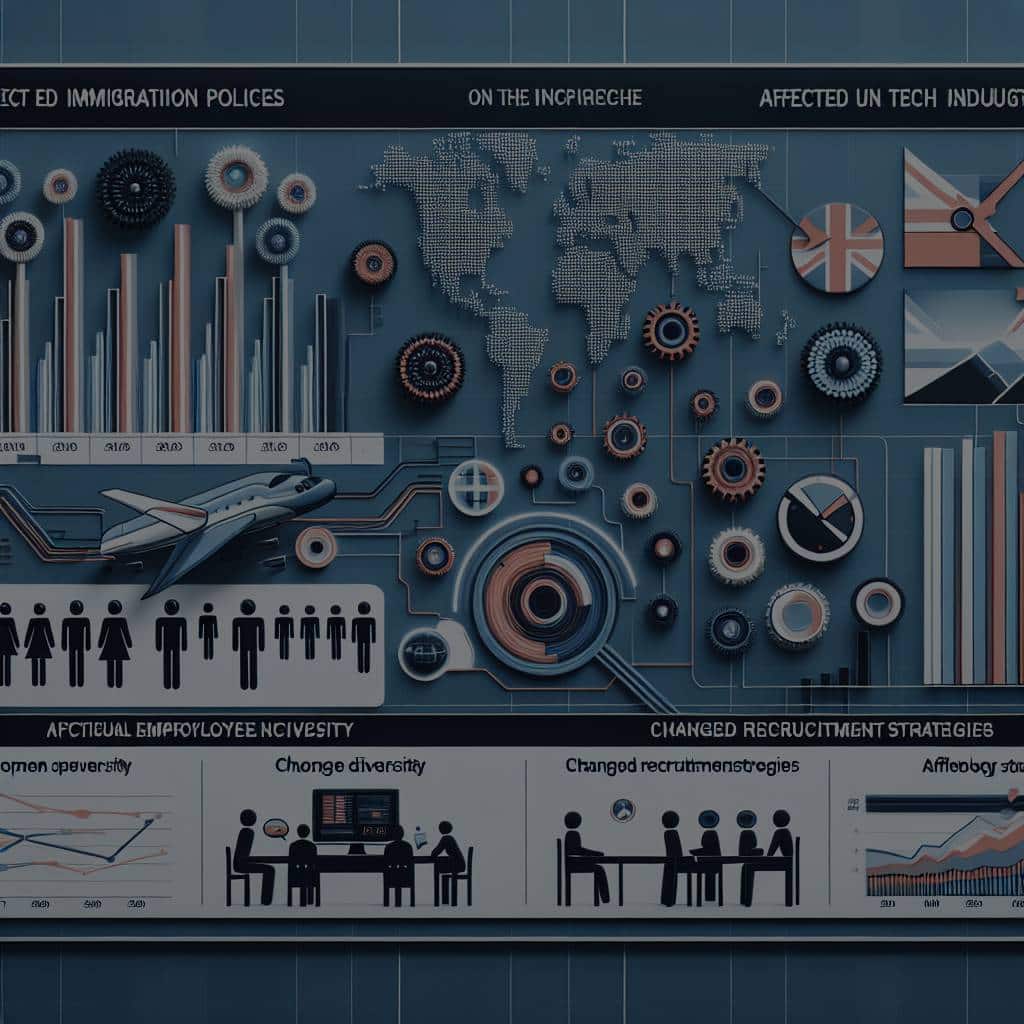Immigration has been the cornerstone of discussion in many political, social, and economic arenas. Indeed, it greatly impacts various aspects of society – from population dynamics to the labour market. This article will delve into the effects of UK immigration policies, focusing particularly on the tech industry workforce.
Overview of UK Immigration Policies
To fully grasp the impact of immigration policies on the tech industry, it is crucial to understand the key elements of these policies. The immigration route for skilled workers in the UK has undergone significant changes in recent years.
Also read : How Can UK Businesses Utilize Solar Energy to Cut Costs?
Since Brexit, the UK government has implemented a points-based system. This system prioritises the migration of skilled workers. Migrants seeking to work in the UK have to score a certain number of points based on various criteria. These include English language proficiency, a job offer at an appropriate skill level, and a salary above a certain threshold.
This shift in policy is designed to attract high-skilled migrants, which implies significant effects on industries that heavily rely on such labour, like the tech sector.
In the same genre : How to Build a UK-Based Global Brand in the Vegan Market?
The Tech Industry’s Dependence on Skilled Migrant Workers
The tech industry has been one of the fastest-growing sectors in the UK economy. It’s an industry that’s heavily reliant on high-skilled labour. This is where the role of immigration becomes pivotal. Skilled migrant workers have been instrumental in the growth and innovation of the UK tech sector.
Migrant workers bring a wealth of experience and skills that are often scarce in the local labour market. They fill the gaps in areas where there’s a shortage of local skills, fostering innovation and driving economic growth. Moreover, their cultural diversity can contribute to a more inclusive and creative work environment.
However, the new points-based immigration system has brought about certain challenges for the tech industry in attracting and retaining foreign talent.
Challenges Posed by the Points-based System
The points-based system may create barriers for the tech industry in attracting overseas talent. The system’s focus on high salaries could potentially exclude younger, less experienced, but highly talented individuals.
As the system requires a job offer from a licensed sponsor, it may deter freelancers or entrepreneurs who don’t have a job offer but are willing to contribute to the tech industry. The process to become a licensed sponsor can also be time-consuming and burdensome for small tech companies, potentially limiting their ability to recruit foreign talents.
Moreover, the points-based system does not consider the specific needs and dynamics of different industries. In the tech industry, where skills and innovation hold more value than formal qualifications, this could be problematic.
The Potential Impact on the Tech Workforce
The implications of these immigration changes may not be immediately apparent, but they will likely become more evident over time. The tech industry might see a shortage of skilled workers, which could stifle innovation and growth.
As tech companies struggle to find the talent they need domestically, they might turn to outsourcing or offshoring, which could lead to job losses in the UK. Additionally, the reduced flow of migrant workers could lead to a less diverse workforce, which could have a negative impact on creativity and innovation.
However, it’s essential to point out that these are potential effects. The actual impact will depend on how the industry and the government respond to these challenges.
Possible Adaptations and Opportunities
Despite the potential negative impacts, the new immigration policies might also present some opportunities. The tech industry, known for its adaptability, can explore other avenues to attract and retain talent.
Widening the talent search to include underrepresented groups in the UK, such as women and ethnic minorities, could be one approach. This would not only help fill the skills gap but also promote diversity within the industry.
The situation could also push the industry to invest more in training and upskilling local workers. This could lead to a long-term benefit, creating a more sustainable and self-sufficient tech workforce in the UK.
While the UK’s new immigration policies present challenges for the tech industry, they also open doors for change and progress. It’s up to the industry, with the help of the government, to seize these opportunities. Only time will tell the true effect of these policies on the tech industry workforce.
The Effect of Immigration Policies on Shortage Occupations in the Tech Industry
Shortage occupations refer to roles that are in high demand within the labour market but are not adequately filled by the local workforce. The tech industry has several such roles that often require a specific set of skills, which are sometimes hard to find within the native workforce. In such instances, migrant workers become essential for the growth and sustainability of the tech industry.
The new points-based immigration system has revised the Shortage Occupation List (SOL), which now includes various roles in the tech industry. While this is a positive step, the higher salary threshold, a key criterion in the points-based system, can pose challenges in attracting overseas talent for these roles.
As per the policy, to be eligible for a work visa, the main applicant must have a job offer from an approved sponsor in an occupation classified as a shortage by the Migration Advisory Committee (MAC). The salary threshold, which currently stands at £25,600 or the "going rate" for the job, whichever is higher, is a significant barrier for workers from lower income countries. This could hinder the recruitment of skilled workers for shortage occupations in the tech industry.
Furthermore, the requirement of a job offer from a licensed sponsor could limit opportunities for more flexible work arrangements such as freelancing or remote work, which are prevalent in the tech industry. This rigid approach, coupled with the lengthy and expensive process of becoming a licensed sponsor, could deter smaller tech companies from hiring overseas talent.
The Long Term Implications of Immigration Policy on the Tech Industry
The tech industry, like the health care sector, depends on foreign skilled workers for its growth and sustainability. The changes in immigration policies have the potential to reshape this industry in the long term.
A reduction in migrant workers due to stringent immigration policies might lead to a less diverse workforce within the industry. As diversity has been linked to increased creativity, innovation, and productivity, this could potentially stagnate the industry. The struggle to find the necessary skills could also lead companies to offshore or outsource tech roles, leading to job losses within the United Kingdom and less control over projects.
However, these challenges also offer opportunities for adaptation and growth. For instance, the tech industry might invest more time and resources in training and upskilling local workers. While this may not immediately fill the skills gap, it could lead to a more sustainable and self-sufficient tech workforce in the long term.
In addition, the tech industry could widen its talent search to include more underrepresented groups within the UK, such as women and ethnic minorities. This could help address the skills shortage, foster diversity, and contribute to a more inclusive tech industry.
While the changes in immigration policy pose challenges, they also present an opportunity for the tech industry to evolve and become more resilient. The long-term effects of these policies remain to be seen but will largely depend on how the industry adapts to these changes and seizes the opportunities presented.
Post-Brexit, the United Kingdom is charting a new course. How the tech industry navigates these changes will play a significant role in defining its future prospects. It remains crucial, however, that the government continues to review and refine its immigration policies to support the industry’s growth and success.











